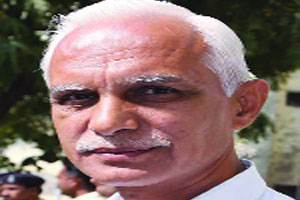
Talaja (Saurashtra), December 11: Frail, simple and grounded — there is nothing about Dr. Kanu Kalsaria’s persona that would suggest that this man could challenge Gujarat Chief Minister Narendra Modi. But he did just that and won, leading an agitation. Now, Dr. Kalsaria, a surgeon, is seeking to extend his winning streak against Mr. Modi to the Assembly elections – and pose a serious challenge to the Gujarat strongman in Saurashtra.
Despite being a BJP MLA, Dr. Kalsaria mobilised a popular agitation in the coastal regions of Saurashtra to successfully stop a multi-crore cement plant of detergent giant Nirma and dragged the Narendra Modi Government to the Supreme Court for it.
This had two firsts – it was unprecedented that any movement in Gujarat could ever prevent an industrial house from setting up shop; second, few could dare do so against Narendra Modi. The BJP did not have the courage to seek Kalsaria’s explanation for defying the party and Modi, leave alone expelling him. For his part, Dr. Kalsaria has not bothered to resign from his parent party, neither has he renewed his membership of the BJP.
Dr. Kalsaria, a BJP MLA from Mahuva in Saurashtra region for three terms in a row since 1998, is not only contesting the elections under his outfit Sadbhavna Manch but has also fielded five other candidates on the strength of his popularity in the region’s coastal belt.
Few believe that Dr. Kalsaria will lose the polls, fighting from Gariadhar constituency carved out after delimitation. His candidates are giving the BJP, the Congress and former chief minister Keshubhai Patel’s Gujarat Parivartan Party a run for their money. While Patel’s party is making the BJP sweat for every vote in Saurashtra, Kalsaria’s “Pandavas”, as he terms his five candidates, are another irritant in a region that may decide the course of the state elections due on December 13 and December 17.
Coincidentally enough, Dr Kanu Kalsaria, with over 50,000 surgeries behind him, began his career as chief medical officer in Modi’s native village Vadnagar in North Gujarat. “When I contested the first election, I was asked how many votes I will get. I said, at least 40,000 votes, which is equivalent to the number of surgeries I have done. I got 36,000,” he grins, without the slightest hint of triumphalism.
That his election symbol, a pot, is queering the pitch for the Lotus, the Hand and the cricket bat (Patel’s party) is not the main story. Dr. Kalsaria, today, has emerged as the lone political voice for the dispossessed farmer in Gujarat, a state where dissent is often described as anti-people — and a challenge to the state’s industry-first development model.
By stopping Nirma’s plant on the grounds of environmental degradation and issues of land acquisition, Dr. Kalsaria’s voice has become a trigger for similar stirrings in other parts of the state though they are yet to take the form of a movement. “I am not against Modi or anyone, I do what I think is right. For me, my people and their woes are more important,” says Dr. Kalsaria, whose Sadbhavna Trust hospital serves the poor of the Mahuva region.
“He is genuine, sincere and committed. There is nothing fake about him. This election contest is to strengthen the voice of the deprived sections, not for political power,” says Manhar Baldania, Sadbhavna’s candidate from Talaja constituency in Amreli district. Just as he spoke of Dr. Kalsaria in his public address, the 5,000-plus crowd, a motley crowd of farmers and residents of Talaja, broke into applause.
“I don’t know where this will lead to but at this point it is important that I do what is right and that’s what I am doing,” the doctor shrugs.





Comments
Add new comment